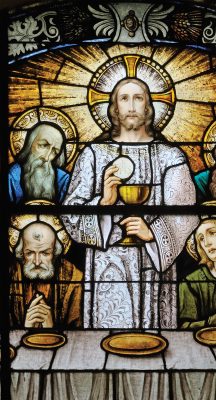Our Catholic faith demands that we live in the tensions that constitute the fullness of truth. This demand applies to the understanding of faith, as it is also a multi-dimensional reality.
The deposit of faith

Revelation is a gift from God, which consists of God’s communication to humanity in the Word. Revelation is made up of words and deeds; in other words, it lets the truth be known, and it saves. The body of revealed truth in both sacred Scripture and sacred tradition that is proposed by the Church for the belief of the faithful is referred to as the deposit of faith, or the contents of the faith, and is considered exterior, or public, revelation.
The response of faith
The theological virtue of faith is the gift “by which we believe in God, and believe all that he has said and revealed to us, and that the Holy Church proposes for our belief, because he is truth itself.” (CCC 1814) This virtue of faith is an interior gift of revelation, and consists of two additional realities.
First, the encounter with revealed truth, exterior revelation, calls for a response. Either we reject revealed truth or we voluntarily accept it. Second, our positive response to revelation is actually God’s gift. We need the interior help of the Holy Spirit, who moves our hearts and opens our minds, to say, “yes,” to exterior revelation. In the New Testament, this interior revelation, or interior testimony, is described as attraction or enlightenment (see John 6:44 and 2 Corinthians 4:6 for examples).
Moments of revelation
 St. Thomas Aquinas wrote, “The habit of faith inclines the soul to accept things suitable to the true faith and not to others.” He understood this interior instinct in terms of the natural tendency of faculties to gravitate toward their proper objects. Now, the intellect has a natural tendency, or instinct, to know the truth. However, since supernatural truth is supernatural, it is not manifested to the intelligence through evidence. Consequently, it does not attract the intelligence.
St. Thomas Aquinas wrote, “The habit of faith inclines the soul to accept things suitable to the true faith and not to others.” He understood this interior instinct in terms of the natural tendency of faculties to gravitate toward their proper objects. Now, the intellect has a natural tendency, or instinct, to know the truth. However, since supernatural truth is supernatural, it is not manifested to the intelligence through evidence. Consequently, it does not attract the intelligence.
For supernatural truth to attract the intellect, the intellect must be perfectly united to this truth. This is precisely what is accomplished by the theological virtue of faith. Faith has a natural tendency, or instinct, to know divine truth. Consequently, faith elevates or enlightens the intellect so that it might accept exterior revelation.
At the same time, the interior gift of faith does not communicate the contents of revelation by itself. Again, it makes the human mind connatural with revealed truth, showing not so much the credibility of the truth, but that it is believable – that truth should be believed. The theological virtue of faith accepts as true that which reason cannot comprehend. This acceptance is based on the authority of God, who makes the revelation. The lack of evidence is overcome by confidence in the one who speaks.
This is not to say that exterior revelation and interior revelation are two different types of revelation. Rather, they are two consecutive moments of revelation. The exterior exercises primacy regarding the contents of faith. The interior is important for our acceptance of the contents of faith because attraction, or enlightenment, predisposes us to receive revealed truth.
Further, these moments can happen separately. For example, the Gospel can be heard but not accepted. Conversely, those who have not heard the Gospel, but have grace and the gift of faith, are predisposed to receive exterior revelation when it comes.
Faith looks like something
[perfectpullquote align=”right” bordertop=”false” cite=”” link=”” color=”” class=”” size=”14″]Coming soon!Diocesan Ministry Day 2021 is planned for this fall and will be focused on the Eucharist theme, “One Body: Gathered, Nourished, Sent.” Stay tuned for date, location and other exciting details! [/perfectpullquote]
Faith is also expressive. Revelation calls us to a radical interior conversion of the heart, to a radical reorientation of our whole life. Supernatural faith means developing an extremely intimate, radical relationship with God that affects our whole existence: our way of thinking, living, wanting and being on earth.
The catechism tells us that this interior conversion “urges expression in visible signs, gestures and works of penance.” (1430) The transforming power of faith reaches its fullest effect, however, only in fulfilling the works of faith – mainly charity, which is also both a gift from God and a fruit of communion with God.
Our Catholic faith demands that we live in the tensions that constitute the fullness of truth. Our faith is no exception to this rule. The three aspects of the one gift of faith are inseparable. The very nature of faith demands an external aspect, an internal aspect and an expressive aspect. The fullness of faith is lost when any one of these aspects is sacrificed.
The Eucharist and the fullness of faith
 In the celebration of the Holy Eucharist, we experience the fullness of faith in its exterior, interior and expressive aspects. Jesus is the perfect revelation of the heart, mind, love and thought of the Father. As such, in the Eucharist we encounter the fullness of the deposit of faith, or exterior revelation. Our response to and subsequent reception of the Eucharist reveals the fullness of interior revelation, as we are able to recognize Christ, the heart of our faith, fully in the bread and wine through the power of the Holy Spirit. Finally, we are sent forth from the eucharistic banquet to fully express the reality of this intimate encounter with God, Father, Son and Holy Spirit, through our loving and serving the Lord in mission.
In the celebration of the Holy Eucharist, we experience the fullness of faith in its exterior, interior and expressive aspects. Jesus is the perfect revelation of the heart, mind, love and thought of the Father. As such, in the Eucharist we encounter the fullness of the deposit of faith, or exterior revelation. Our response to and subsequent reception of the Eucharist reveals the fullness of interior revelation, as we are able to recognize Christ, the heart of our faith, fully in the bread and wine through the power of the Holy Spirit. Finally, we are sent forth from the eucharistic banquet to fully express the reality of this intimate encounter with God, Father, Son and Holy Spirit, through our loving and serving the Lord in mission.
For further reflection
“Whoever eats my flesh and drinks my blood has eternal life, and I will raise him on the last day”… These things he [Jesus] said while teaching in the synagogue in Capernaum … “But there are some of you who do not believe.” Jesus knew from the beginning the ones who would not believe and the one who would betray him. And he said, “For this reason I have told you that no one can come to me unless it is granted him by my Father.” As a result of this, many [of] his disciples returned to their former way of life and no longer accompanied him (John 6:54, 59, 64-66).
- As you reflect on this passage, what elements of faith are present or absent? What difference does it make to the outcome of the story?
- What does this passage, as well as the article, have to say to those who demand concrete evidence to justify one’s faith? What is revealed through such demands?
Doug Culp is the CAO and secretary for pastoral life for the Diocese of Lexington, Kentucky. He holds an MA in theology from Catholic Theological Union in Chicago.






















